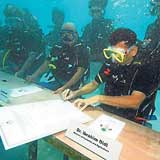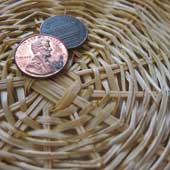Contributed by Jay Gamelin, Lexington, S. C.
Warm-up Question
Have you ever received a large financial gift? What did you do with it?
Where Does Our Money Go”
 Quadriga Art helped several non-profit companies raise millions of dollars to support their work with poor and marginalized populations from Native American children to disabled veterans. So why are these non-profits in debt to Quadriga? Can this possibly be okay?
Quadriga Art helped several non-profit companies raise millions of dollars to support their work with poor and marginalized populations from Native American children to disabled veterans. So why are these non-profits in debt to Quadriga? Can this possibly be okay?
It’s hard to say.
On one side, the company raises money for programs that are meant to help others but have a high cost to run. When these projects fail it is not the fault of the fundraiser but the management of the projects. If the project uses all the money raised without paying the fundraising company, the project owes a debt to the fundraising company. The fundraising company cannot be held accountable of poor management in the nonprofits.
On the other hand, it is the fundraiser’s job to raise this money. The projects these non-profits create are dependent on the support of the fundraisers and it is their work to make sure the goals are achieved. If they do not reach their goals, can this be the fault of the nonprofits?
This issue raises questions about how we give and support projects we believe are worthy. When we give to something, are we sure that the money is going where we think it is? How much of the money we give goes to the project and how much goes to administration, support, advertising, and yes, the fundraising effort itself?
As this issue is resolved through investigations, it is clear that the greater lesson to be learned is this- know where you are giving and be sure your dollar is doing what you think it is doing.
Discussion Questions
- Who is at fault in this case? Do you find yourself supporting the non-profits or the fundraiser? Why?
- When was the last time you gave to a charity (outside of church)? How much research did you put into the charity and how they use their income? What do you think your money is doing?
- How do you balance your own giving? How much of your own money do you give to causes you think are worthy? What is a goal you have for your own giving?
Scripture Texts (NRSV) for Sunday, October 14, 2012 (Twentieth Sunday after Pentecost
(Text links are to Oremus Bible Browser. Oremus Bible Browser is not affiliated with or supported by the Evangelical Lutheran Church in America. You can find the calendar of readings for Year C at Lectionary Readings.)
For lectionary humor and insight, check the weekly comic Agnus Day.
Gospel Reflection
What do we make of the rich young ruler in our gospel? Is this a man troubled by the evils of wealth? Is love for money the root of all evil? It seems so, if we are to take this text at face value. Perhaps it is easier to pass a camel through a needle than for a rich person to enter the kingdom. Why?
Jesus holds up for the rich young ruler the laws of Moses and the ruler says he has followed “these.” But what is to be noticed is not what is listed but what is not: “You shall have no other God before me” “Observe the Sabbath” and “Do not covet” are missing. This is a remez style of rabbinical teaching, where what we are notice is not what is quoted but what is around it and we pay attention to what is not said. By removing these commands, we look at the reality that this is not about money but rather that he has another God and it is his own wealth, that he has not honored the Sabbath (perhaps working instead!) and that this has led to him wanting more and more. Jesus recommends expelling this from his life, to get rid of this idol. Seems so easy, right?
We cannot simply remove wealth from our lives as if it were cancer. In today’s culture, we need it for food, clothing, shelter, etc. The issue is not the money, it’s what happens when we serve it as our god. When wealth and accumulation becomes our goal we lose what is more important, justice and mercy. Amos says that we are to seek good, and this can be done with wealth. It has great power to do good things. But we also need to be wise with our wealth. We need to be sure we give generously, so that it does not control us, but also wisely, so that it is being used for holy purposes. Seek the wisdom to use your monies for good so that you may control it rather than have it control you.
Discussion Questions
- What are some things you think money is good for? How has it been a help? What are ways you have seen money used poorly?
- What are projects you have been interested in giving a hand to? What needs are in the world you would be interested in supporting financially? Have you done this? Why or why not?
- Do you know of examples in your life, people or other entities, you look up to when it comes to money and giving? Does their faith affect them in their decisions?
- What are some other things you think are great gifts of God but can quickly become idols? (i.e. image problems, overindulgence of food, over-exercise, etc.)
Activity Suggestions
Charity Watch:
For this activity, you will need a computer connection. Let’s take a look at some non-profits and how they use their money. Visit a site such as http://www.charitynavigator.org/. Think of some non-profit organizations that you may want to consider giving to. If you are looking for some direction, try these: Lutheran World Relief, Compassion International, YWCA, World Vision, Kare Youth League, and Blood:water mission. How do you think they are doing? Hint: Don’t just look at the score! Take a close look at the information such as the number of dollars that go to program as opposed to administration. Perhaps some are better than they may appear on the surface! Which might you be interested in helping?
There are many worthy places to support. It is our job to seek where our heart meets the needs of the world. No one can give to every worthy place, instead decide where your heart is called and get determined to give what you can to support this call.
Closing Prayer
The earth is yours and everything in it, Lord, ourselves, our time, and our possessions. Help us to use what you have given us to be signs of life and good. Lead us to those places that need us. We turn over what we have to you, in the name of Jesus. AMEN.




 Girifushi, Maldives — To the lowest-lying nation on earth, global warming is a serious issue. Some fear that due to the melting of polar ice caps, the
Girifushi, Maldives — To the lowest-lying nation on earth, global warming is a serious issue. Some fear that due to the melting of polar ice caps, the  When the widow’s two copper coins fell amongst the very noticeable offerings given by others ahead of her, Jesus seized the opportunity to open his disciple’s eyes to the gift she had given. Certainly, when the treasury was accounted for, her coins would not be thrown away. They would be used. Giving to the treasury was expected, but for those who had next to nothing to give, it was a tremendous sacrifice in comparison to those who gave so little from their abundance. The widow’s contribution counted because she sacrificed more than she could afford to.
When the widow’s two copper coins fell amongst the very noticeable offerings given by others ahead of her, Jesus seized the opportunity to open his disciple’s eyes to the gift she had given. Certainly, when the treasury was accounted for, her coins would not be thrown away. They would be used. Giving to the treasury was expected, but for those who had next to nothing to give, it was a tremendous sacrifice in comparison to those who gave so little from their abundance. The widow’s contribution counted because she sacrificed more than she could afford to.